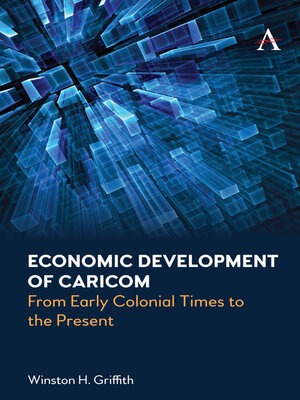Economic Development of Caricom
ebook ∣ From Early Colonial Times to the Present
By Winston H. Griffith

Sign up to save your library
With an OverDrive account, you can save your favorite libraries for at-a-glance information about availability. Find out more about OverDrive accounts.
Find this title in Libby, the library reading app by OverDrive.



Search for a digital library with this title
Title found at these libraries:
| Library Name | Distance |
|---|---|
| Loading... |
The early pioneers of development attributed the poor economic and social conditions in less developed nations to cultural and environmental elements. Some argued that their small size was also a contributing element. In the latter decades of the twentieth century proponents of the neoclassical counterrevolution shifted the focus to the dirigiste policies of governments. Taking a heterodox approach, however, this study argues that the persistent low level of development in CARICOM nations is due to their being utilized as global agricultural and manufacturing production platforms, their enduring colonial economic and social structures that have slowed down economic transformation, the negative attitudes of classes, the anti-development policies of some governments and, since the human element provides the motor forces that ultimately drive development, their failure to accumulate an adequate pool of knowledge skills that are now dominating production processes in the new global economy.
|It has been suggested that, if CARICOM nations wish to accelerate their development, they should embrace laissez-faire economic policies. However, laissez-faire economic policies have reinforced the very economic and social structures that have contributed to their low level of development; furthermore, laissez-faire economic policies ignore social attitudes that can greatly influence a nation's development. Moreover, low-skilled labor-intensive production processes, which once propelled growth in CARICOM nations, will no longer perform a similar role because production processes are becoming more and more knowledge-skills intensive, and nations wishing to attract foreign manufacturing investment or high-tech services may not be able to do so without an adequate pool of the necessary knowledge skills. CARICOM nations must therefore try to accumulate a pool of knowledge skills that can help their economies become internationally competitive.







